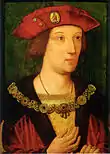1502
Year 1502 (MDII) was a common year starting on Saturday (link will display the full calendar) of the Julian calendar.
| Millennium: | 2nd millennium |
|---|---|
| Centuries: | |
| Decades: | |
| Years: |
| 1502 by topic |
|---|
| Arts and science |
|
| Leaders |
|
| Birth and death categories |
| Births – Deaths |
| Establishments and disestablishments categories |
| Establishments – Disestablishments |
| Works category |
|
| Gregorian calendar | 1502 MDII |
| Ab urbe condita | 2255 |
| Armenian calendar | 951 ԹՎ ՋԾԱ |
| Assyrian calendar | 6252 |
| Balinese saka calendar | 1423–1424 |
| Bengali calendar | 909 |
| Berber calendar | 2452 |
| English Regnal year | 17 Hen. 7 – 18 Hen. 7 |
| Buddhist calendar | 2046 |
| Burmese calendar | 864 |
| Byzantine calendar | 7010–7011 |
| Chinese calendar | 辛酉年 (Metal Rooster) 4198 or 4138 — to — 壬戌年 (Water Dog) 4199 or 4139 |
| Coptic calendar | 1218–1219 |
| Discordian calendar | 2668 |
| Ethiopian calendar | 1494–1495 |
| Hebrew calendar | 5262–5263 |
| Hindu calendars | |
| - Vikram Samvat | 1558–1559 |
| - Shaka Samvat | 1423–1424 |
| - Kali Yuga | 4602–4603 |
| Holocene calendar | 11502 |
| Igbo calendar | 502–503 |
| Iranian calendar | 880–881 |
| Islamic calendar | 907–908 |
| Japanese calendar | Bunki 2 (文亀2年) |
| Javanese calendar | 1419–1420 |
| Julian calendar | 1502 MDII |
| Korean calendar | 3835 |
| Minguo calendar | 410 before ROC 民前410年 |
| Nanakshahi calendar | 34 |
| Thai solar calendar | 2044–2045 |
| Tibetan calendar | 阴金鸡年 (female Iron-Rooster) 1628 or 1247 or 475 — to — 阳水狗年 (male Water-Dog) 1629 or 1248 or 476 |
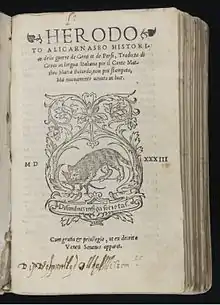
Italian translation of Herodotus' Histories made for Count Matteo Maria Boiardo and published in Venice, Aldine Press in 1502.
Events
January–June
- January 1 – Portuguese explorers, led by Gonçalo Coelho, sail into Guanabara Bay, Brazil, mistaking it for the mouth of a river, which they name Rio de Janeiro.[1]
- February 12 – Isabella I issues an edict outlawing Islam in the Crown of Castile, forcing virtually all her Muslim subjects to convert to Christianity.
- May 3 – Portuguese navigator João da Nova discovers the uninhabited island of Saint Helena.[2]
- May 11 – Christopher Columbus leaves Cadiz, Spain for his fourth and final trip to the New World. He explores Central America, and discovers St. Lucia (possibly),[3] the Isthmus of Panama, Honduras, and Costa Rica.
July–December
- July – Ismail I becomes Shah of Persia.[4]
- August 14 – Christopher Columbus lands at Trujillo, and names the country 'Honduras'.
- September – A Greek and Italian parallel text edition of Herodotus' Histories, done for Count Matteo Maria Boiardo, is published in Venice by Aldus Manutius.
- September 18 – Christopher Columbus lands at Costa Rica.
- September 29; The Wedding of Vladislaus II of Bohemia and Hungary and Anne of Foix-Candale
- October 1 – An annular solar eclipse occurs.
- November 7 – Columbus reaches the coast of Honduras, and passes south to Panama.
- December 26 – Cesare Borgia kills Ramiro d'Orco; this incident is referenced in Machiavelli's The Prince
- December 31 – Cesare Borgia (son of Pope Alexander VI) occupies Urbino, where he imprisons two potentially treacherous allies, Vitellozzo and Oliveretto; he executes them the next morning.
Date unknown
- The first African slaves brought to the New World arrive at the island of Hispaniola (modern-day Haiti and Dominican Republic).
- Bristol merchants return from Newfoundland (first so named this year from a letter) to England, carrying three native people and cod from the Grand Banks.[5][6]
- Moctezuma II is elected emperor of the Aztecs, following the death of Ahuitzotl.
- Meñli I Giray defeats the Golden Horde and sacks their capital, Sarai.
- Wittenberg University is founded.
- In Germany, Peter Henlein of Nuremberg uses iron parts and coiled springs to build a portable timepiece.
- In Italy, Asher Lämmlein declares that the Jewish Messiah will arrive in the next 6 months, resulting in the year of penance.
- The King's School, Macclesfield, England, is founded by Sir John Percyvale.
- Heinrich Cornelius Agrippa receives the degree of magister artium from the University of Cologne.[7]
- Wilhelm Bombast moves to Villach with his son, Paracelsus.
Births
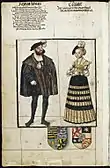
Elisabeth of Hesse, Hereditary Princess of Saxony
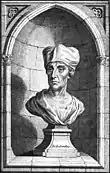
John Leland
- January 3 – Yi Hwang, Korean Neo-Confucian scholar (d.1571)
- January 7 – Pope Gregory XIII, born Ugo Boncompagni, Bolognese-born pontiff (d. 1585)[8]
- January 20 – Sebastian de Aparicio, Spanish colonial industrialist and saint in Mexico (d. 1600)
- February 2 – Damião de Góis, Portuguese philosopher (d. 1574)
- March 4 – Elisabeth of Hesse, Hereditary Princess of Saxony (d. 1557)
- March 18 – Philibert of Chalon, French nobleman (d. 1530)
- March 20 – Pierino Belli, Italian soldier and jurist (d. 1575)
- April 2 – Susanna of Bavaria, German noble of the House of Wittelsbach (d. 1543)
- April 10 – Otto Henry, Count Palatine of Neuburg (1505–1559) and Elector Palatine (1556–1559) (d. 1559)
- April 25 – Georg Major, German Lutheran theologian (d. 1574)
- June 2 – Guillaume Bigot, French writer (d. 1550)
- June 6 – King John III of Portugal (d. 1557)[9]
- July 26 – Christian Egenolff, German printer (d. 1555)
- July 27 – Francesco Corteccia, Italian composer (d. 1571)
- August 14 – Pieter Coecke van Aelst, Flemish painter (d. 1550)
- September 14 – Louis II, Count Palatine of Zweibrücken, Duke of Zweibrücken from 1514 to 1532 (d. 1532)
- December 6 – Anna of Brunswick-Lüneburg, Duchess consort of Pomerania (d. 1568)
- December 13 – George III, Landgrave of Leuchtenberg (d. 1555)
- date unknown
- Takeno Jōō, Japanese Sengoku period master of the tea ceremony and merchant (d. 1555)
- Miguel López de Legazpi, Spanish conquistador (d. 1572)
- Pedro Nunes, Portuguese mathematician (d. 1578)
- Francesco Spiera, Italian Protestant jurist (d. 1543)
- Anthony Maria Zaccaria, Cremonese founder of the Barnabite Order and saint (d. 1539)
- probable
- Elizabeth Blount, English courtier, mistress of King Henry VIII of England (d. 1540)
- Cuauhtémoc, last Aztec ruler (Tlatoani) of Tenochtitlán and the last "Aztec Emperor" (d. 1525)
- Blaise de Lasseran-Massencôme, seigneur de Montluc, marshal of France (approximate date; d. 1577)
- Hurrem Sultan, Ruthenian-born Haseki sultan of the Ottoman Empire (d. 1558)
- Henry Percy, 6th Earl of Northumberland, English courtier (d. 1537)
Deaths
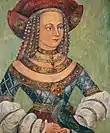
Hedwig Jagiellon, Duchess of Bavaria
January–June
- February 18 – Hedwig Jagiellon, Duchess of Bavaria (b. 1457)
- March – Francesco Laurana, Dalmatian-born sculptor (b. c. 1430)
- March 2 – Jan I Carondelet, Burgundian jurist and politician (b. 1428)
- April 2 – Arthur, Prince of Wales, English prince, eldest son of Henry VII of England (b. 1486)[10]
- April 15 – John IV of Chalon-Arlay, Prince of Orange (1475–1502) (b. 1443)
- April 20 – Mary of Looz-Heinsberg, Dutch noble (b. 1424)
- May 4 – Berthold II of Landsberg, Bishop of Verden (1470–1502) and Hildesheim (1481–1502) (b. 1464)
- May 6 – James Tyrrell, English knight, alleged murderer of the princes in the Tower (executed) (b. c. 1450)
- June 9 – Astorre III Manfredi, Italian noble (b. 1485)
July–December
- July 15 – Luka Radovanović, Catholic priest (b. 1425)
- August 18 – Knut Alvsson, Norwegian nobleman and politician (b. 1455)
- August 31 – Thomas Wode, Lord Chief Justice of the Common Pleas
- September 1 – Sōgi, Japanese Buddhist priest and poet (b. 1421)
- October 14 – Diego Hurtado de Mendoza y Quiñones, Spanish noble (b. 1444)
- November 10 – George I of Münsterberg, Imperial Prince, Duke of Münsterberg and Oels, Graf von Glatz (b. 1470)
- November 13 – Annio da Viterbo, Italian Dominican friar and scholar (b. 1432)
- December 31
- date unknown
References
- Ben Box; Mick Day (2000). Brazil Handbook. Footprint. p. 97. ISBN 978-1-900949-50-7.
- The traditional May 21 date is the Protestant feast day for Saint Helena (empress), and would not have been marked this day by the Portuguese, because they were members of the Catholic Church, and also because the island was discovered before the Reformation started. The discovery date is quoted as 3 May during the 16th/17th centuries, corresponding to the Catholic Feast day of the True Cross, a date that is closely linked to the name of Saint Helena. Bruce, Ian (2015). "St Helena Day" (PDF). Wirebird: The Journal of the Friends of St Helena (44): 32–46. Archived (PDF) from the original on October 9, 2022.
- "History of St. Lucia". Retrieved May 6, 2011.
- The New Encyclopædia Britannica: Micropædia, Encyclopædia Britannica, 1991, ISBN 978-0-85229-529-8, p. 295.
- Fabyan, Robert (1516). The New Chronicles of England and France.
- Nansen, Fridtjof (1911). In Northern Mists: Arctic Exploration in Early Times.
- Valente, Michaela (2006). "Agrippa, Heinrich Cornelius". In Hanegraaff, Wouter J. (ed.). Dictionary of Gnosis and Western Esotericism. Leiden: Brill. pp. 4–8. ISBN 90-04-15231-8.
- Chisholm, Hugh, ed. (1911). . Encyclopædia Britannica. Vol. 12 (11th ed.). Cambridge University Press. p. 575.
Gregory XIII. (Ugo Buoncompagno), pope from 1572 to 1585, was born on the 7th of January 1502, in Bologna
- Encyclopedia Americana: Jefferson to Latin. Scholastic Library Pub. 2006. p. 113. ISBN 978-0-7172-0139-6.
- Derrik Mercer (February 1993). Chronicle of the Royal Family. Chronicle Communications. p. 137. ISBN 978-1-872031-20-0.
- Academi Gymreig (2008). The Welsh Academy Encyclopaedia of Wales. University of Wales Press. p. 343. ISBN 978-0-7083-1953-6.
This article is issued from Wikipedia. The text is licensed under Creative Commons - Attribution - Sharealike. Additional terms may apply for the media files.
